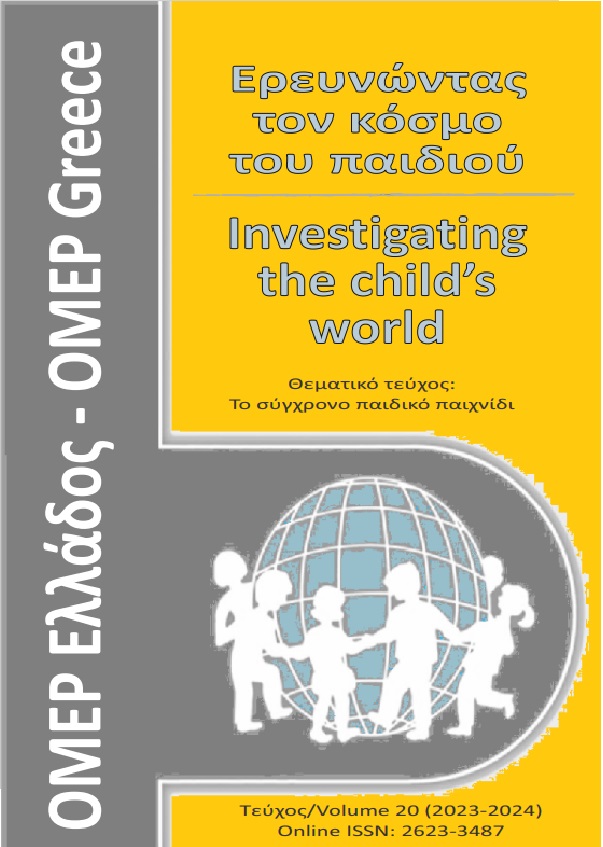Ένα πολύγλωσσο νηπιαγωγείο: νέες παιχνιδοποιημένες τάσεις και προκλήσεις στην εκμάθηση της δεύτερης γλώσσας
Résumé
Η έρευνα εστιάζει στην εκμάθηση της δεύτερης γλώσσας μέσω της παιχνιδοποίησης σε παιδιά πρoσχολικής ηλικίας με προσφυγική ή/και μεταναστευτική εμπειρία. Στόχος της είναι να χαρτογραφήσει και να αναλύσει καινοτόμες παιχνιδοποιημένες παρεμβάσεις που έχουν εφαρμοστεί στο πλαίσιο της προσχολικής εκπαίδευσης σε προσφυγικούς πληθυσμούς και να αναδείξει τα μαθησιακά τους οφέλη. Από την βιβλιογραφική έρευνα εντοπίστηκαν οκτώ (8) παιχνιδοποιημένες παρεμβάσεις, οι οποίες αναδεικνύουν τις πιθανές τάσεις, αλλά και τις τρέχουσες προκλήσεις στην προσχολική εκπαίδευση δίνοντας έμφαση στην τεχνολογία και την καινοτομία. Η ανάλυση δεδομένων ανέδειξε τις παιχνιδοποιημένες τεχνικές που εφαρμόστηκαν στον υπό μελέτη πληθυσμό και τα στοιχεία σχεδιασμού παιχνιδιού που ανταποκρίνονται στις κοινωνικές και γλωσσικές τους ανάγκες. Τέλος, αναδεικνύονται τα μαθησιακά οφέλη που προσφέρουν οι παιχνιδοποιημένες παρεμβάσεις σε παιδιά με μεταναστευτική/προσφυγική εμπειρία και οι προβληματισμοί για την ένταξη τους στο εκπαιδευτικό πλαίσιο του νηπιαγωγείου.
Article Details
- Comment citer
-
Μπιζώτα Κ., & Παπαδοπούλου Μ. (2024). Ένα πολύγλωσσο νηπιαγωγείο: νέες παιχνιδοποιημένες τάσεις και προκλήσεις στην εκμάθηση της δεύτερης γλώσσας. Ερευνώντας τον κόσμο του παιδιού, 20, 156–172. https://doi.org/10.12681/icw.35380
- Rubrique
- Επιστημονική αρθρογραφία & εκπαιδευτικές δράσεις

Ce travail est disponible sous licence Creative Commons Attribution - Pas d’Utilisation Commerciale 4.0 International.
Οι Συγγραφείς που δημοσιεύουν εργασίες τους σε αυτό το περιοδικό συμφωνούν στους παρακάτω όρους:
Οι Συγγραφείς διατηρούν τα Πνευματικά Δικαιώματα και χορηγούν στο περιοδικό το δικαίωμα της πρώτης δημοσίευσης ενώ ταυτόχρονα τα πνευματικά δικαιώματα της εργασίας προστατεύονται σύμφωνα με την Creative Commons Attribution License που επιτρέπει σε τρίτους - αποδέκτες της άδειας να χρησιμοποιούν την εργασία όπως θέλουν με την προϋπόθεση της διατήρησης των διατυπώσεων που προβλέπονται στην άδεια σχετικά με την αναφορά στον αρχικό δημιουργό και την αρχική δημοσίευση σε αυτό το περιοδικό.
Οι Συγγραφείς μπορούν να συνάπτουν ξεχωριστές, και πρόσθετες συμβάσεις και συμφωνίες για την μη αποκλειστική διανομή της εργασίας όπως δημοσιεύτηκε στο περιοδικό αυτό (π.χ. κατάθεση σε ένα ακαδημαϊκό καταθετήριο ή δημοσίευση σε ένα βιβλίο), με την προϋπόθεση της αναγνώρισης και την αναφοράς της πρώτης δημοσίευσης σε αυτό το περιοδικό.
Το περιοδικό επιτρέπει και ενθαρρύνει τους Συγγραφείς να καταθέτουν τις εργασίες τους μέσω διαδικτύου (π.χ. σε ένα ακαδημαϊκό καταθετήριο ή στους προσωπικές τους ιστοσελίδες) πριν και μετά από τις διαδικασίες της δημοσίευσης, καθώς αυτό μπορεί να οδηγήσει σε παραγωγική ανταλλαγή ιδεών και σκέψεων καθώς επίσης και σε γρηγορότερη και μεγαλύτερη χρήση και ευρετηρίαση της δημοσιευμένης εργασίας (See The Effect of Open Access).



